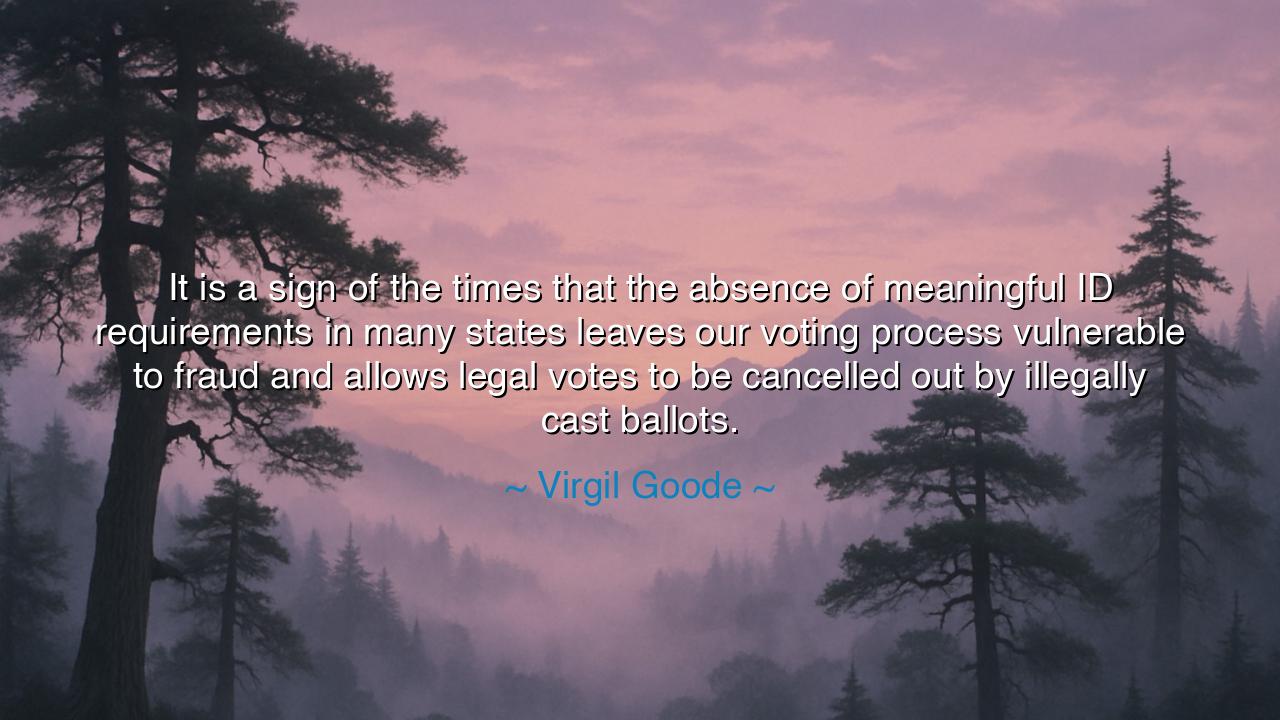
It is a sign of the times that the absence of meaningful ID
It is a sign of the times that the absence of meaningful ID requirements in many states leaves our voting process vulnerable to fraud and allows legal votes to be cancelled out by illegally cast ballots.






The words of Virgil Goode resound with both warning and lament: “It is a sign of the times that the absence of meaningful ID requirements in many states leaves our voting process vulnerable to fraud and allows legal votes to be cancelled out by illegally cast ballots.” In these lines, he points to the fragile heart of democracy—the vote—and the dangers that arise when its sanctity is left unguarded. For in every free society, the ballot is not merely a piece of paper or a mark on a screen; it is the sacred voice of the people, the measure of equality, the weapon of the weak against the powerful. To undermine it is to shake the very foundation of a nation.
At the core of Goode’s words is the recognition that democracy rests on trust. If citizens believe that their vote is stolen, diluted, or rendered meaningless, their faith in the system withers. And when faith dies, apathy or unrest soon follows. Thus, the absence of meaningful identification is not just a matter of administrative detail—it is, in his view, a breach in the fortress wall, a door through which fraud may enter and corrode the legitimacy of the whole process. His statement is not about ID alone, but about the integrity of self-governance.
History has shown us how fragile the people’s trust can be. In the final days of the Roman Republic, elections were increasingly tainted by bribery, manipulation, and violence. Candidates purchased votes with promises of bread and gold, and the purity of the process was lost. As corruption spread, citizens ceased to believe that their voices mattered, and thus the Republic crumbled into Empire. Goode’s words echo this lesson: if the people suspect fraud, even without proof, the soul of democracy is weakened, and tyranny finds a foothold.
Yet his words also reveal a deeper tension. For while he calls for protection against fraud, others fear that barriers to voting may themselves silence the poor, the elderly, or the marginalized. Thus, the challenge is not merely to demand ID, but to ensure that the path to lawful voting is accessible to all. Justice lies not in restriction or recklessness, but in balance: making the process both secure and open, both trusted and inclusive. Without this harmony, laws can either smother freedom or leave it undefended.
A modern story illuminates this truth. In nations where elections have been marred by fraud—such as in parts of Africa or Eastern Europe—citizens sometimes walk for miles, waiting in long lines, only to learn that their votes have been stolen or replaced. The result is not only anger but despair, the sense that their voice counts for nothing. Compare this with places where transparent and secure systems are in place, where voters feel assured that each ballot is guarded like treasure. In such societies, participation is high, for the people believe in the worth of their effort. The difference lies not in wealth or technology, but in trust and fairness.
The lesson, then, is clear: the integrity of the vote must be protected with vigilance. Laws must be crafted to shield the ballot from fraud, yet without crushing the voices of the weak. Every citizen must take seriously their role as guardian of democracy—demanding both security and access, for one without the other is a half-truth that leads to ruin.
Therefore, children of tomorrow, heed this wisdom: guard your vote as you would your freedom, for they are one and the same. Do not allow it to be stolen by fraud, nor withheld by injustice. Support reforms that build both fairness and protection, and hold leaders accountable to the principle that every legal vote must count, and only legal votes must count. For in the end, democracy is not preserved by speeches or monuments, but by the daily courage of citizens who insist that their voice, and the voices of their neighbors, remain sacred and unbroken.






AAdministratorAdministrator
Welcome, honored guests. Please leave a comment, we will respond soon